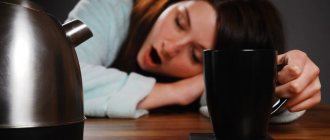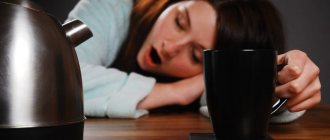So that you don't want to sleep from coffee
The problem is not widespread, although it is difficult to call it rare. Therefore, it is useful for everyone to understand why the usual remedy does not work correctly, how dangerous it is, and how to react to such behavior of the body. Just to begin with, it’s worth remembering how caffeine acts on a person, and what you need to know about its correct intake. There are several key points that medical experts recommend always remembering.
- Coffee and tea are not a substitute for clean water. With its deficiency, metabolic processes are disrupted, and the body may behave differently than you are used to. This is especially true during the warm season. On hot days, you should “exchange” several cups of coffee for a glass of pure mineral or regular water.
- People with nervous system disorders should not abuse coffee. This leads to general overexcitation and impaired reactions.
- Very strong coffee can cause disturbances in heart rate and blood pressure. A reaction here is needed immediately: if after another cup of coffee the condition worsens sharply - weakness, tachycardia and hand tremors occur - you need to immediately drink a glass of clean water. It will reduce the concentration of caffeine in the blood.
- Not only grain, but also instant coffee is a stimulant. The question of what type of this drink and how it affects different people remains unclear. Therefore, an individual reaction is what you should focus on first.
How does the invigorating drink work?
The human nervous system is very complex. Each of its receptors is responsible for certain processes in the body. And it is adenosine that causes the desire to sleep. When drinking coffee drinks, caffeine, which is very similar in structure to the sleep receptor, replaces it.
As a result, the nervous system simply cannot recognize the correct signal, because its receptors are blocked.
The effect of good coffee lasts up to five to six hours. But it is worth noting that increasing the dosage does not always affect vigor. Three cups a day are enough to feel good.
What effects are observed:
- Loss of sleep and lethargy. As a result, a person begins to think better.
- Blood pressure rises as blood flows faster to the brain.
- The stomach and intestines begin to work more actively, and the person will soon want to eat.
- The kidneys are stimulated, resulting in frequent urination.
- Metabolism improves.
There are many positive qualities of coffee. It is highly effective and is considered a good method for awakening. But in some cases it doesn't help at all.
Stimulant overdose
Another reason why you want to sleep after coffee is basic addiction to the drink due to its frequent use. When working on a complex project, we often don’t notice how quickly we consume cup after cup, and our body gets used to the drink, reducing its effect.
How to fix the situation:
- reduce the amount of caffeine consumed per day;
- 1–3 times a week, replace morning coffee with a healthy and equally invigorating contrast shower;
- pay attention to the regime: if you want to sleep even during periods of peak activity, it is very possible that you do not have enough fresh air; regular ventilation of the premises and walks for 2 hours (minimum) a day will help;
- master breathing exercises, it takes 1-3 minutes per hour, but it perfectly tones and normalizes blood counts, pressure, and heart rhythms;
- add vitamins to your diet, starting with tea with lemon.
Breaks between cups of strong coffee must be required - from 1–2 to 5 hours, depending on individual characteristics.
Getting your body used to caffeine
Doctors recommend taking short breaks between drinking coffee.
Drinking several cups of coffee daily can become addictive. The drink will no longer give you vigor, or even become a cause of loss of strength. Increasing the dose of caffeine will lead to heart problems, but the effect will not last long - after a while the situation will repeat itself. You should give up your favorite drink for several weeks, then your sensitivity to coffee will be restored in full.
conclusions
Summarizing all of the above, we can identify 4 reasons for drowsiness after drinking coffee:
- individual characteristics of a person - a non-standard reaction to caffeine, which may be safe for health or indicate abnormalities;
- caffeine overdose;
- addiction to a natural stimulant;
- coffee quality
- health problems that require careful attention.
It is extremely difficult to identify the specific cause of a non-standard reaction to coffee on your own. Therefore, in order to avoid long-term treatment, the appearance of other symptoms of a complex disease and the unpleasant consequences of advanced diseases, it is worth consulting a doctor.
Caffeine overdose as a cause of coffee drowsiness
Not only health problems, a poor-quality drink or habit can cause drowsiness. It turns out that large amounts of caffeine can cause the body to work completely differently than a person expects.
If you drink several cups of invigorating liquid in a short time, the blood vessels in the brain begin to narrow. As a result, oxygen passes less easily to the tissues, and the person himself begins to feel the urge to sleep and becomes lethargic. Sweating, hand tremors, and nausea may also occur.
MORE: Does coffee wash calcium out of the body?
How can you help yourself?
- Ventilate the room and get some fresh air. Do some breathing exercises.
- Make yourself sweet tea, preferably with lemon. This will restore blood flow and nutrition to brain tissue.
- Eat well to improve your condition.
In the future, avoid overdose and make yourself a new portion of coffee no earlier than 2-3 hours after the previous one.
What to do if coffee makes you sleepy
If cases of drowsiness are rare, you should pay attention to the amount of coffee consumed per day. Scientists disagree on this issue, but are unanimous that you should not take more than 5 cups of a strong invigorating drink a day. If your dose is higher, try different drinks:
- homemade lemonade;
- green tea;
- black tea with sugar and lemon.
Do you always want to sleep after drinking coffee? Be sure to try to find the reason, it can be serious. There is only one way out - temporarily stop taking caffeine-containing products and consult a doctor. Do not remain indifferent to your health, and any food (drink) in your diet will give exactly the effect you expect.
Drowsiness after coffee and poor health
Do you feel inexorably sleepy after the first cup? Then you should consider visiting a doctor.
- Coffee drowsiness is one of the symptoms of adrenal fatigue . They are responsible for the production of stress hormones. If the adrenal glands are stimulated to work too often, including by excessive coffee consumption, then their functionality weakens. Organs cope worse with the production of adrenaline. Therefore, after a cup of coffee, the expected invigorating effect does not occur. The adrenal glands are simply unable to release a new portion of adrenaline, which provides the feeling of a surge of vivacity and energy.
- Drowsiness after coffee may signal an activation of a form of the Epstein-Bar virus . This is a herpes virus that affects almost half of the people on the planet. In its dormant form it is not dangerous, but its active form causes the development of a large number of diseases. One of the symptoms of the awakening of the virus is a depressed state of the nervous system, which is no longer affected by the usual pathogens, including coffee.
- The fact that you feel sleepy after drinking coffee may indicate a disruption of the nervous system due to overwork or infection . If the system is overloaded, then an additional stimulant has the effect of a drop overflowing the cup. The non-standard recommendations of some doctors are also based on this effect. They suggest treating insomnia with a cup of coffee. An overtired nervous system simply cannot withstand the load and “turns off.”
What to do if after the first cup of coffee you feel sleepy?
- Temporarily eliminate the drink from your diet until you are sure that everything is in order with your health.
- Go to the doctor. Drowsiness after a cup of drink, of course, is not the main symptom of the disease, but it is worth seeing a specialist.
Is it possible to drink coffee before bed?
You should not drink coffee before bed unless absolutely necessary. This is a tonic drink that can disrupt sleep and wakefulness, cause increased blood pressure and severe headaches. If it is impossible to refuse the drink, it must be made weak and be sure to dilute it with a large amount of milk or cream.
The only case when coffee can be of benefit before bed is if a person has not rested for a long time, but he definitely needs to stay alert. Then a cup of coffee is drunk. And you should go to bed right away. Caffeine will begin to act depending on the characteristics of the body - after 20-40 minutes, this time will be enough for the brain to relax a little.
The person will wake up refreshed and will be able to continue doing his job. This technique is also indispensable for those who often have to be in different time zones. But you should not abuse this coffee drink unnecessarily, as it greatly wears out the body.
The effect of coffee on human sleep
It is known that coffee is one of the main sources of caffeine among plant products. This substance is an active stimulant of the nervous and cardiovascular systems, which has an invigorating effect.
In each organism, the influence of coffee products can have its own shades:
- vigor, activation;
- elimination of drowsiness, muscle weakness;
- concentration, composure.
Under certain conditions of the body, the drink can also have the opposite effect: cause drowsiness, fatigue, lethargy, and apathy.
Everyone knows that coffee should have an invigorating and tonic effect, but this statement is not entirely accurate. Probably, information about golden grains became the object of advertising when the drink was popularized among the masses and only its beneficial aspects were presented.
In fact, the work of coffee is more complicated, and its secret lies in the composition of the drink. The coffee bean consists of 2 “layers” – the core and the shell. The outer part accumulates caffeine compounds, and the inner part accumulates theobromine. These substances affect the body in different ways.
Whole bean and ground coffee contain both components, and instant coffee is prepared only from kernels.
The caffeine shell is used for the production of pharmacological drugs, food additives and energy drinks.
It turns out that the caffeine content in the instant powder is negligible, which is why many people notice that natural grain coffee has an invigorating effect, while freeze-dried coffee has no effect or even puts you to sleep.
Effects of caffeine
Experts say that the caffeine component has an invigorating effect, which begins immediately after drinking the drink and lasts only 20-35 minutes - depending on the type of beans and the characteristics of the body.
Caffeine activates the nervous system, makes the brain work faster, stimulates heart contractions, accelerates blood flow, helps eliminate toxins, and speeds up digestive processes and metabolism.
All this creates a feeling of a surge of energy, but this effect does not last long, and - as often happens - it is replaced by a phase of rest, and sometimes fatigue. This is partly due to the fact that coffee does not bring energy with it, but only awakens the body's internal resources.
Effect of theobromine
The substance theobromine has a relaxing and calming effect; unlike caffeine, it dilates blood vessels and helps normalize heart rate and blood pressure.
The tricky thing about the coffee effect is that, in contrast to caffeine, the action of its “companion” often causes drowsiness and loss of strength in people.
To neutralize the soporific effect, it is recommended to sip a portion of coffee for 1-1.5 hours, then new caffeine molecules will balance the effect of theobromine.
The effect of coffee in some sources is called the “thirtieth kilometer”. This is due to the fact that drivers who drink a dose of coffee on the road manage to drive about 30 km invigorated while the caffeine takes effect, and then suddenly feel lethargic.
This increases the risk of accidents, which is why experts do not recommend drinking coffee before setting off, especially after insufficient sleep, and you should only get behind the wheel if you are truly alert and sober.











